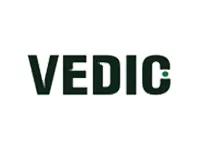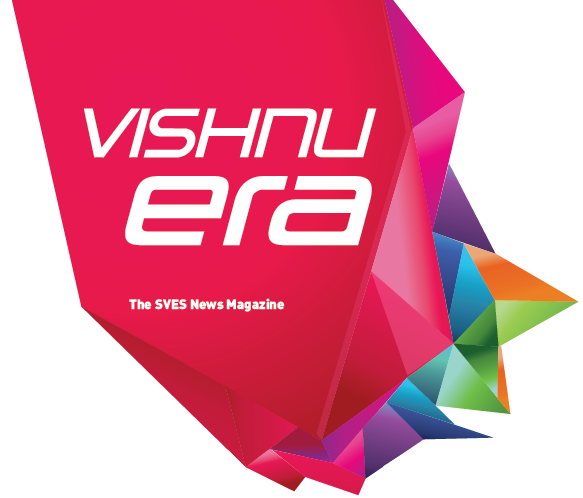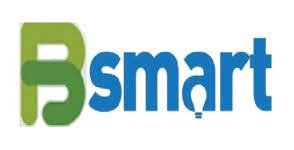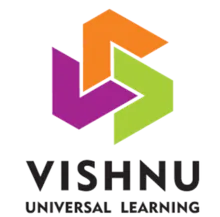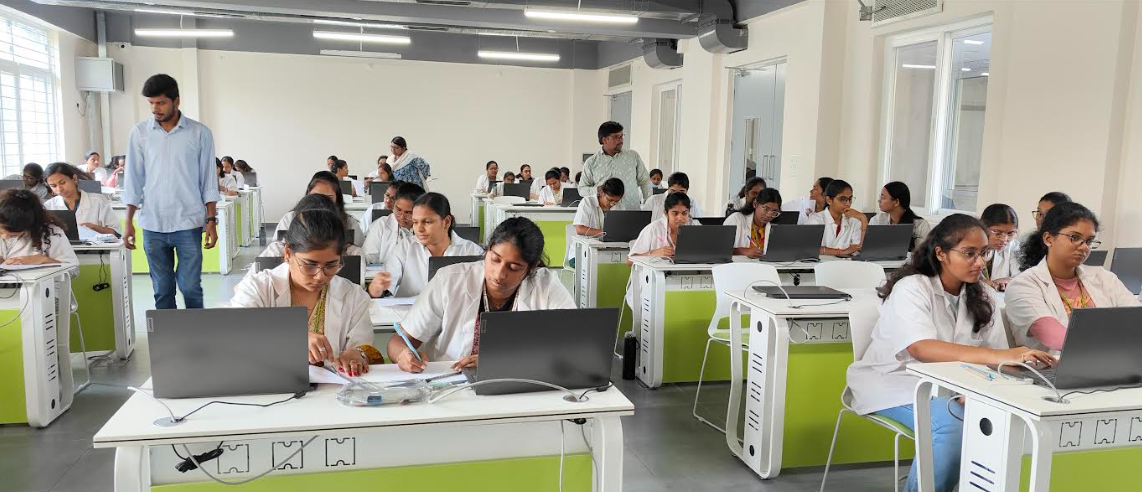Department has 6 well equipped state of art laboratories with the latest configuration systems. Systems are connected via local area network to the Domain Server (BVRITH). Students are encouraged to engage themselves in getting practiced with laboratory experiments in their leisure hours by keeping the labs open even after the college hours.
This Lab is related to OS theory where students are able to compare and contrast various CPU scheduling algorithms, page replacement algorithms, memory allocation and file allocation strategies.
Course Objectives:
- To provide an understanding of the design aspects of operating system concepts through simulation
- Introduce basic Unix commands, system call interface for process management, interprocess communication and I/O in Unix
Course Outcomes:
- Simulate and implement operating system concepts such as scheduling, deadlock management, file management and memory management.
- Able to implement C programs using Unix system calls
This Lab is related to DBMS theory where they use MySql Database.
Student will have practical exposure on designing, developing and querying
database.
Course Objectives:
- Introduce ER data model, database design and normalization
- Learn SQL basics for data definition and data manipulation
Course Outcomes:
- Design database schema for a given application and apply
normalization - Acquire skills in using SQL commands for data definition and data manipulation.
- Develop solutions for database applications using procedures, cursors and triggers
Course Objectives:
- To implement the static web pages using HTML and do client side
validation using JavaScript. - To design and work with databases using Java
- To develop an end to end application using java full stack.
- To introduce Node JS implementation for server side programming.
- To experiment with single page application development using React
Course Outcomes:
- Build a custom website with HTML, CSS, and Bootstrap and little
JavaScript. - Demonstrate Advanced features of JavaScript and learn about JDBC
- Develop Server – side implementation using Java technologies like
- Develop the server – side implementation using Node JS.
- Design a Single Page Application using React
It covers various concepts of C programming language, searching and
sorting algorithms, stacks and queues. It gives Ability to develop C programs
for computing and real-life applications using basic elements like control
statements, arrays, functions, pointers and strings, and data structures like
stacks, queues and linked lists.
Course Objectives:
- It covers various concepts of C programming language
- It introduces searching and sorting algorithms
- It provides an understanding of data structures such as stacks and
queues.
Course Outcomes:
- Ability to develop C programs for computing and real-life applications using basic elements like control statements, arrays, functions, pointers and strings, and data structures like stacks, queues and linked lists.
- Ability to Implement searching and sorting algorithms
In this lab Students will be able to write core java programs using SDK 1.8
using Eclipse.
Course Objectives:
- To write programs using abstract classes.
- To write programs for solving real world problems using the java
collection framework. - To write multithreaded programs.
- To write GUI programs using swing controls in Java.
- To introduce java compiler and eclipse platform.
- To impart hands-on experience with java programming.
Course Outcomes:
- Able to write programs for solving real world problems using the java
collection framework. - Able to write programs using abstract classes.
- Able to write multithreaded programs.
- Able to write GUI programs using swing controls in Java.
Course Objectives:
- Effective use of Business Intelligence (BI) technology (Tableau) to apply data visualization
- To discern patterns and relationships in the data.
- To build Dashboard applications.
- To communicate the results clearly and concisely.
- To be able to work with different formats of data sets
Course Outcomes:
- Understand How to import data into Tableau.
- Understand Tableau concepts of Dimensions and Measures.
- Develop Programs and understand how to map Visual Layouts and
Graphical Properties. - Create a Dashboard that links multiple visualizations.
- Use graphical user interfaces to create Frames for providing solutions to real world problems.
Course Objectives:
- The objective of this lab is to get an overview of the various machine
learning techniques and can demonstrate them using python.
Course Outcomes:
- Understand modern notions in predictive data analysis
- Select data, model selection, model complexity and identify the trends
- Understand a range of machine learning algorithms along with their strengths and weaknesses
- Build predictive models from data and analyze their performance
Course Objectives:
- Become familiar with basic principles of AI toward problem solving, knowledge representation, and learning.
Course Outcomes:
- Apply basic principles of AI in solutions that require problem solving, knowledge representation, and learning
It covers developing web applications using technologies Node JS, React,
Express and Angular, usage of MongoDB for web applications.
Course Objectives:
- Introduce fast, efficient, interactive and scalable web applications using run time environment provided by the full stack components.
Course Outcomes:
- Design flexible and responsive Web applications using Node JS, React,
Express and Angular. - Perform CRUD operations with MongoDB on huge amount of data.
- Develop real time applications using react components.
- Use various full stack modules to handle http requests and responses.
It covers writing and testing on an Raspberry Pi and basic functionalities
like Light an LED, Flash an LED, status of a bulb at a remote place (on the
LAN) through web.
Course Objectives:
- To introduce the raspberry PI platform, that is widely used in IoT
applications - To introduce the implementation of distance sensor on IoT devices
Course Outcomes:
- Ability to introduce the concept of M2M (machine to machine) with
necessary protocols and get awareness in implementation of distance sensor - Get the skill to program using python scripting language which is
used in many IoT devices.
This lab covers Scripting Languages like Ruby, Perl, TCL and TK. The
programs designed to strengthen the practical expertise.
Course Objectives:
- To Understand the concepts of scripting languages for developing web based projects
- To understand the applications the of Ruby, TCL, Perl scripting
languages
Course Outcomes:
- Ability to understand the differences between Scripting languages and programming languages
- Gain some fluency programming in Ruby, Perl, TCL
It involves developing applications, user interface and URL related applications in android environment
Course Objectives:
- To learn how to develop Applications in an android environment.
- To learn how to develop user interface applications.
- To learn how to develop URL related applications.
Course Outcomes:
- Understand the working of Android OS Practically.
- Develop user interfaces.
- Develop, deploy and maintain the Android Applications.
Course Objectives:
- To provide knowledge of software testing methods.
- To develop skills in automation of software testing and software test
automation management using the latest tools.
Course Outcomes:
- Design and develop the best test strategies in accordance with the
development model. - Design and develop GUI, Bitmap and database checkpoints
- Develop database checkpoints for different checks
- Perform batch testing with and without parameter passing
Course Objectives:
- To understand the working principle of various communication
protocols. - To understand the network simulator environment and visualize a network topology and observe its performance
- To analyze the traffic flow and the contents of protocol frames
Course Outcomes:
- Implement data link layer farming methods
- Analyze error detection and error correction codes.
- Implement and analyze routing and congestion issues in network
design. - Implement Encoding and Decoding techniques used in presentation
layer - To be able to work with different network tools
Course Objectives:
- Develop a sustainable infrastructure for applications and ensure high scalability.
- DevOps aims to shorten the software development lifecycle to provide continuous
delivery with high-quality.
Course Outcomes:
- Understand the need of DevOps tools
- Understand the environment for a software application development
- Apply different project management, integration and development tools
- Use Selenium tool for automated testing of application
Course Objectives:
- Learns to Implement Flutter Widgets and Layouts
- Understands Responsive UI Design and with Navigation in Flutter
- Knowledge on Widges and customize widgets for specific UI elements, Themes
- Understand to include animation apart from fetching data
Course Outcomes:
- Implements Flutter Widgets and Layouts
- Responsive UI Design and with Navigation in Flutter
- Create custom widgets for specific UI elements and also Apply styling
using themes and custom styles. - Design a form with various input fields, along with validation and
error handling - Fetches data and write code for unit Test for UI components and also
animation
It covers encryption and decryption, DES algorithm logic, Blowfish algorithm
logic, Rijndael algorithm logic, RSA algorithm, SHA-1 algorithm, MD5
algorithm using java and Diffie-Hellman Key Exchange mechanism using
HTML and JavaScript.
Course Objectives:
- Explain the importance and application of each of confidentiality, integrity, authentication and availability
- Understand various cryptographic algorithms.
- Understand the basic categories of threats to computers and networks
- Describe public-key cryptosystem.
- Describe the enhancements made to IPv4 by IPSec
- Understand Intrusions and intrusion detection
Course Outcomes:
- Student will be able to understand basic cryptographic algorithms,
message and web authentication and security issues. - Ability to identify information system requirements for both of them such as client and server.
- Ability to understand the current legal issues towards information
security.
Course Objectives:
- Introduce the major concepts of language translation and compiler
design and impart the knowledge of practical skills necessary for
constructing a compiler. - Topics include phases of compiler, parsing, syntax directed
translation, type checking use of symbol tables, code optimization
techniques, intermediate code generation, code generation and data flow analysis.
Course Outcomes:
- Demonstrate the ability to design a compiler given a set of language
features. - Demonstrate the knowledge of patterns, tokens & regular expressions for lexical analysis.
- Acquire skills in using lex tool & yacc tool for developing a scanner
and parser. - Design and implement LL and LR parsers
- Design algorithms to do code optimization in order to improve the performance of a program in terms of space and time complexity.
- Design algorithms to generate machine code


